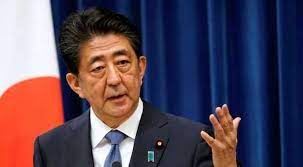Part 1 of 2 Parts
Shinzo Abe is a former Prime Minister of Japan. Last Sunday he suggested that Japan should break a long-standing taboo and hold an active debate on the possibility of Japanese acquisition of nuclear weapons. He included the possibility of some sort of “nuclear sharing” program similar to the one that NATO operates in conjunction with the U.S. His comments were prompted by the Russian invasion of Ukraine. He said, “Japan is a signatory to the Nuclear Non-Proliferation Treaty and has its three non-nuclear principles, but it should not treat as a taboo discussions on the reality of how the world is kept safe.”
Abe quit as Japanese Prime Minister in 2020 but is still highly influential as the head of the ruling Liberal Democratic Party’s largest faction. He noted that if Ukraine had kept some of the Soviet nuclear weapons stationed there during the Cold War instead of sending them back to Russia in exchange for a security guarantee, it may not have been invaded by Russia a few days ago.
Abe stressed what the Japanese government said is an “increasingly severe security environment” in Asia. This includes threats posed by China’s growing assertiveness and North Korea’s nuclear program. Abe pointed to NATO’s nuclear sharing arrangements as an example of how Japan could counter those and other threats to its security. He said, “Japan should also consider various options in its discussions, including nuclear sharing.
The NATO nuclear sharing arrangement permits the U.S. to keep its nuclear weapons in Europe under its custody. It allows allies who do not have nuclear weapons to share them and participate in the decision-making process in the event that their use is being considered.
The Japanese cities of Hiroshima and Nagasaki were devastated by U.S. atomic bombs at the end of World War II. This makes it the only country on Earth that has ever experienced a nuclear attack. Currently, Japan relies on the U.S. nuclear umbrella to deter threats. This was written into the pacifist postwar Constitution that was drawn up at the end of World War II after Japan surrendered.
Japan has three non-nuclear principles that were first laid out in 1967. They call for Japan to never possess, produce or allow nuclear weapons on Japanese territory. The spirit of these principles has been secretly violated in the past. Polling suggests that the Japanese citizens remain steadfastly against the idea of Japan acquiring its own nuclear arsenal. However, Abe hinted that a sharing agreement similar to NATO’s could be a more acceptable option for the Japanese public.
Abe said that “Many people in Japan probably don’t know about the NATO sharing system.” Abe added that Japan would have to maintain its long-held goal of abolishing nuclear weapons. He also said that “It’s important to move toward that goal, but when it comes to how to protect the lives of Japanese citizens and the nation, I think we should conduct discussions by taking various options fully into consideration.”
Please read Part 2 next
Nuclear Weapons 767 – Japan May Reconsider Acquiring Nuclear Weapons – Part 1 of 2 Parts

